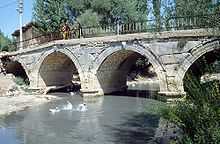Penkalas Bridge
| Penkalas Bridge | |
|---|---|
 Penkalas Bridge in 1992 | |
| Crosses | Penkalas (Kocaçay) |
| Locale | Aezani, Turkey |
| Design | Arch bridge |
| Material | Stone |
| Number of spans | 5 |
| Construction end | 2nd century AD |
 Penkalas Bridge | |
The Penkalas Bridge is a Roman bridge over the Penkalas (today Kocaçay), a small tributary of the Rhyndakos (Adırnas Çayı), in Aezani, Asia Minor (Çavdarhisar in present-day Turkey).
The 2nd-century AD structure was once one of four ancient bridges in Aezani and is assumed to have been the most important crossing-point due to its central location in the vicinity of the Zeus temple and the direct access it provided to the Roman road to Cotyaeum (Kütahya).[1] According to reports by European travellers, the ancient parapet remained in use as late as 1829, having been replaced today by an unsightly iron railing.[1]
Around 290 m upstream, another well-preserved, almost identical five-arched Roman bridge leads across the Penkalas.[1]
References
Sources
- Galliazzo, Vittorio (1994), I ponti romani. Catalogo generale, Vol. 2, Treviso: Edizioni Canova, p. 403 (No. 839), ISBN 88-85066-66-6
- O’Connor, Colin (1993), Roman Bridges, Cambridge University Press, p. 124 (No. E12), ISBN 0-521-39326-4
See also
- List of Roman bridges
- Roman architecture
- Roman engineering
External links
![]() Media related to Penkalas Bridge at Wikimedia Commons
Media related to Penkalas Bridge at Wikimedia Commons
- Aezani and the Penkalas Bridge at Romeartlover
| ||||||||
Coordinates: 39°12′3″N 29°36′44″E / 39.20083°N 29.61222°E
